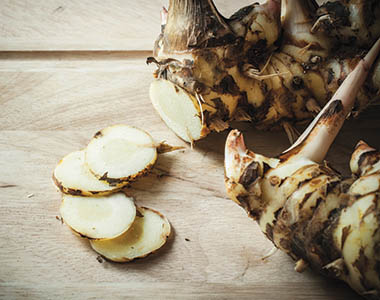Of the top 10 causes of death in America, Alzheimer's disease is the only one that can't be prevented, cured or slowed.
At least that's what mainstream doctors in the West will tell you…
But try telling that to the people of Bali.

The galangal root is similar to ginger, but it has a bit more bite. Some people describe it as "piney" or "woodsy."
You see, Alzheimer's disease (AD) is extremely rare in Bali. And the majority of people living on Bali who DO have Alzheimer's are expats from the West.
Part of the reason why the Balinese don't get AD may lie in one incredible plant that they've been using to treat a wide variety of medical conditions for generations.
It's called galangal. The root of the galangal plant has been used in Southeast Asia cooking and traditional medicine for thousands of years.
What is galangal root used for?
And studies show it's a powerful brain booster.
Indian scientists caused Alzheimer's-type amnesia in mice. Treating mice with an extract from greater galangal (called galangin) greatly reduced the effect. The treated mice had lower levels of free radicals. And they showed better performance in remembering their way through a maze.1 In other words, galangal boosted their brain power and memory.
Part of the reason galangal may help stop AD is because studies show galangin is a potent acetylcholinesterase (AChEl) inhibitor.2
What is acetylcholinesterase (AChEl) inhibitor?
AChEl is an enzyme that breaks down a chemical called acetylcholine in your body. This chemical helps send messages between nerve cells.
But people with Alzheimer's have lower levels of acetylcholine in their brains. They also have fewer nerve cells that use acetylcholine. Low levels of acetylcholine and a loss of these nerve cells are linked to more severe symptoms.
So in other
words, galangal helps stop the breakdown of this important chemical.Benefits of Galangal Root
But galangal may help in other ways, too. Studies have shown that it helps increase blood flow to the brain.3 That helps prevent the onset of dementia and other brain disorders.
My friends in Bali also use galangal as a digestive aid. They say it helps treat:
- Indigestion
- Stomach ache
- Motion and morning sickness
- Hiccups
- Nausea
- Chronic gastritis
- Ulcers
But that's not all. Galangal also has antibacterial and antiviral qualities.4 That's why it's often used to boost the immune system, treat flu and colds, and reduce fever. And multiple studies show galangal contains several compounds that prevent and kill cancer cells.5
Spice up your health

The people in Bali use galangal as a spice in their meals. White galangal root is what gives Thai soups their distinctive flavor.
You can find fresh galangal at Asian markets and specialty stores, but I recommend the dried root. It keeps longer.
Cooking with galangal is easy. You can crush the dried root and use it as a spice, or cut up the dried root and add it to your soups. It also adds a distinctive flavor to fish dishes and helps cut down the "fishy" taste.
Or, if you're a tea drinker like me, you can also make a tea using dried roots infused in hot water. Just take one teaspoon of dried, ground galangal root and steep it in two cups of boiling water. Let it sit for at least 15 minutes.
Galangal is also available in capsule form, as a powder, and in tinctures mixed with ginger. If you choose to supplement, I recommend taking 100 mg twice a day.
Galangal truly is a remarkable root. I've been so impressed with its healing powers that not only did I devote an entire chapter to it in my book Healing Herbs of Paradise, I also added it to one of my new supplements.
To Your Good Health,
![]()
Al Sears, MD, CNS
1. Singh H et al. "Neurotransmitter Metabolic Enzymes and Antioxidant Status on Alzheimer's Disease induced Mice Treated with Alpinia galanga (L.) Willd." Phytother Res. 2011; (7): 1061-7.
2. Guo, Ava J.Y. "Galangin, a flavonol derived from Rhizoma Alpiniae Officinarum, inhibits acetylcholinesterase activity in vitro." Chemico-Biological Interactions. 187 (2010) 246–248.
3. Aggarwal B et al. "Identification of Novel Anti-Inflammatory Agents from Ayurvedic Medicine for Prevention of Chronic Diseases." Curr. Drug Targets. 2011 Oct 1;12(11): 1595-1653.
4. Middleton E, Kandaswami C. "The impact of plant flavonoids on mammalian biology: Implication for immunity, inflammation and cancer." In: Harborne J. "The flavonoids: Advances in Research since 1980." London, Chapman and Hall. 1993. Pp.6190652.
5. King's College London. Thai curry ingredient has anti-cancer properties. 03 Feb 2005.

